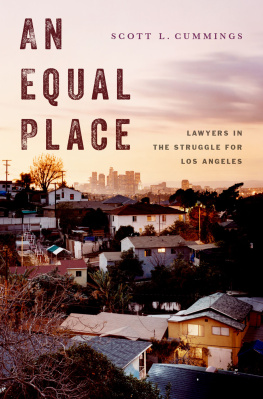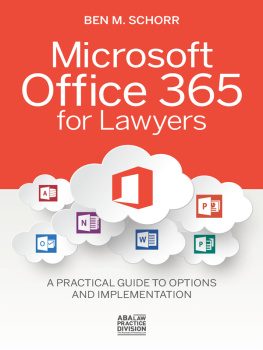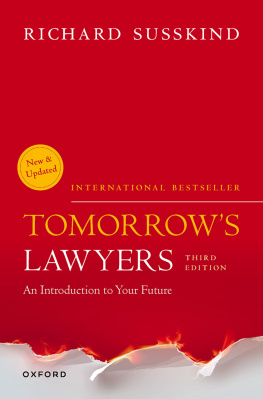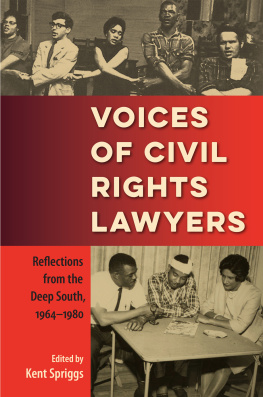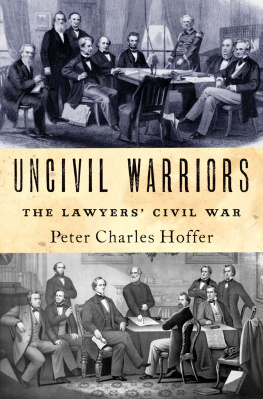An Equal Place

Oxford University Press is a department of the University of Oxford. It furthers the Universitys objective of excellence in research, scholarship, and education by publishing worldwide. Oxford is a registered trade mark of Oxford University Press in the UK and certain other countries.
Published in the United States of America by Oxford University Press
198 Madison Avenue, New York, NY 10016, United States of America.
Oxford University Press 2021
All rights reserved. No part of this publication may be reproduced, stored in a retrieval system, or transmitted, in any form or by any means, without the prior permission in writing of Oxford University Press, or as expressly permitted by law, by license, or under terms agreed with the appropriate reproduction rights organization. Inquiries concerning reproduction outside the scope of the above should be sent to the Rights Department, Oxford University Press, at the address above.
You must not circulate this work in any other form and you must impose this same condition on any acquirer.
Library of Congress Control Number: 2018029428
ISBN 9780190215927
eISBN 9780190215941
To Ingrid
For building a place with me.
Contents
For nearly two decades, I have had the enormous privilege of teaching law to students passionately committed to social justice at a proudly public university in one of the most diverse and dynamic cities in the world. This book is a product of that privilege. It is, first and foremost, the product of inspiration I have drawn from incredible students over the years, who have always taught me more than I could ever teach them about what it takes to ensure that our society gives more to those with less. With their enormous talents, they could choose to do anything. The fact that they choose to stand with people with less privilegeto struggle as equals alongside themalways moves and motivates me.
I wanted to write about lawyers dedicated to the ideal of equality to capture what that struggle looks like, how it plays out over the arc of time, and why it matters so profoundly for our future. When I was a law student, stories about social justice lawyers were my sustenance. Learning about the work of old giants like Gary Bellow, Ruth Bader Ginsburg, Cruz Reynoso, Thurgood Marshall, and Marian Wright Edelman, and new visionaries like Luke Cole and Jennifer Gordon got me through. For this book, I wanted to write accounts of contemporary lawyers that would resonate with the current generationmy own students who would go (and literally have gone) out to carry on the movements I describe. In this regard, the book is dedicated to all the public interest students I have known who have worked to make our city, state, and nation more equal places. They are the coauthors of this books ongoing stories.
That I have been able to author this book is also a product of my own unique institutional place. The UCLA School of Law has been my irreplaceable home since 2002. Every day, when I take the glorious walk, rain or shine (mostly shine), across the iconic quad, anchored by four landmark Romanesque Revival buildings built nearly a century ago, I feel humbled to live in a state that has made (and continues to make, albeit to a lesser degree) such an enormous investment in its people and that has been particularly committed to ensuring access to education for so many for whom being on campus is the fulfillment of their familys struggle to achieve the American Dream. Passing by the students each day is to profoundly appreciate the strength in our nations incredible diversity.
My law school, nestled on the eastern perimeter of campus where I end my daily walk, has itself been a beacon of egalitarian values. As an upstart founded in 1949, it was one of the first law schools in the country to hire women and faculty of color; to grant full tenure to clinical faculty; to foster sociolegal scholarship on law as an instrument of social justice; to create a specialization in critical race studies; and to establish a specialization in public interest lawnow called the Epstein Program in Public Interest Law and Policy (or Public Interest Law Program, for short)which is the community that has nurtured and supported me since I was a junior faculty member. I could not have written this book anywhere else.
The genesis of the book was a 2004 seminar I taught called Problem Solving in the Public Interesta required second-year course for students in our Public Interest Law Program, in which I served as faculty director for six years and continue to play an active role. The seminar was designed to expose students to different modes of advocacy, emphasizing the theme that social change happens when lawyers work in coordination with other actorsorganizers, community residents, researchers, communications specialists, and political officialsand that struggle is ongoing and adaptive. In this particular class, I decided to illustrate these themes by focusing on case studies of local advocacy. The initial choices were not systematic. I was originally drawn to a campaign I had observed as a newly minted community economic development lawyer a few years earlier: the movement to win the nations first community benefits agreement in downtown Los Angeles, in connection with the project now known as L.A. Live. For the course, I assigned background materials on redevelopment in Los Angeles, current news articles, and materials from the campaign; we took a field trip to the area; and I invited in key advocates, including Jerilyn Lpez Mendoza from Environmental Defense. The class was a tremendous success and a profound learning experience for the students and me. Two years later, I taught the seminar around paired case studies: the legal resistance to sweatshops in the garment industry and the fight to stop Wal-Marts planned opening of a Supercenter, which housed a cut-rate grocery staffed by nonunionized workers and thus posed an existential threat to Los Angeless unionized grocery sector.
As that course ended, I had two important insights. First, the stories were interconnected, and the individual campaigns aspired to broader movement-building and city transformation. There were overlapping organizations and actors; and it was clear that there was a larger goalreforming the burgeoning low-wage economythat animated the campaigns. Second, I realized that I needed to disseminate the stories beyond the confines of my classroom. The lessons they taught spoke more broadly to students and practicing lawyers interested in understanding the impact they could make and responded directly to ongoing scholarly debates about the role of lawyers in social movements. The seeds of the book project were thus planted.
My first insight led me to more systematically study the role of lawyers in the place immediately around me: my own City of Los Angeles. When I arrived in Los Angeles in the summer of 1998, on the cusp of a Skadden Fellowship in Public Counsel Law Centers Community Development Project, it was clear to me the city was in the midst of a tectonic change. There was a feeling of motion. Important coalitions were taking shape: the L.A. Living Wage Coalition, anchored by the still nascent Los Angeles Alliance for a New Economy, which was formed to create synergies between community organizing and the labor movement; and the Metropolitan Alliance, anchored by Action for Grassroots Empowerment and Neighborhood Developmentknown as AGENDAwhich had grown out of the 1992 uprising to tackle the root causes of disinvestment and disenfranchisement in South Los Angeles. These coalitions were developing alongside the birth of the Los Angeles worker center movement. Richard Riordan, a business-friendly Republican, was mayor, but the gathering strength of progressive activism pointed toward impending political change at the city level. Confronting these grassroots developments were brewing challenges, including gentrification fueled by city-subsidized redevelopment and the proliferation of low-wage work. Therefore, when I decided to write this book, I was motivated by wanting to better understand the changes around me and how they impacted the communities with which I had worked. As I began to develop the case studies, I also realized thatin addition to providing accounts of legal mobilizationthey traced the broader rise of progressive activism in Los Angeles and the resurgence of the labor movement in local politics. As this project began to unfold, Los Angeles became both an object of study and an ideal of diversity, inclusion, and solidarity to be realized.

